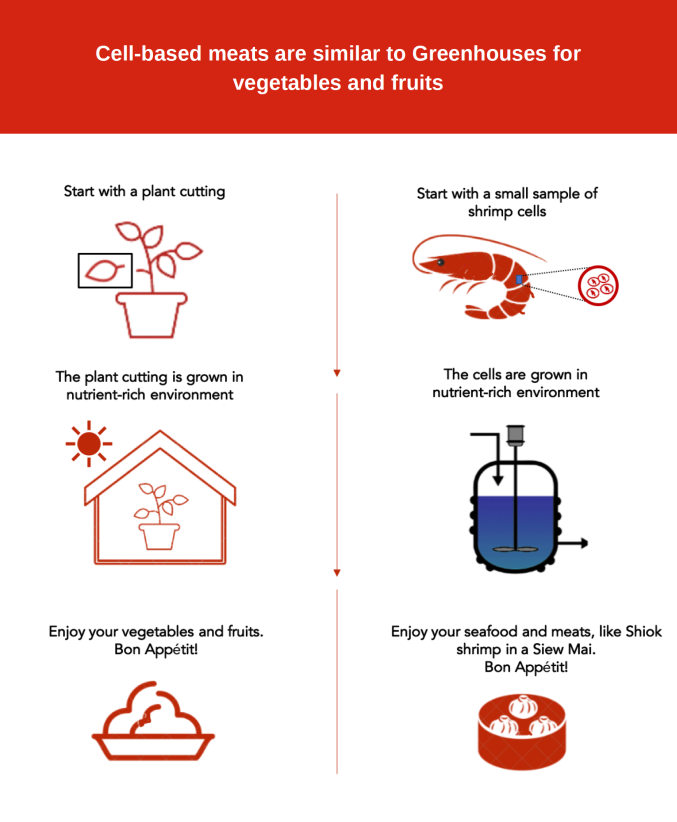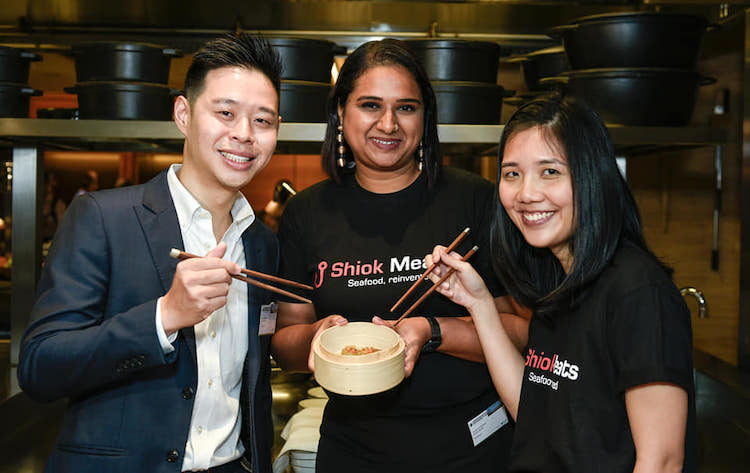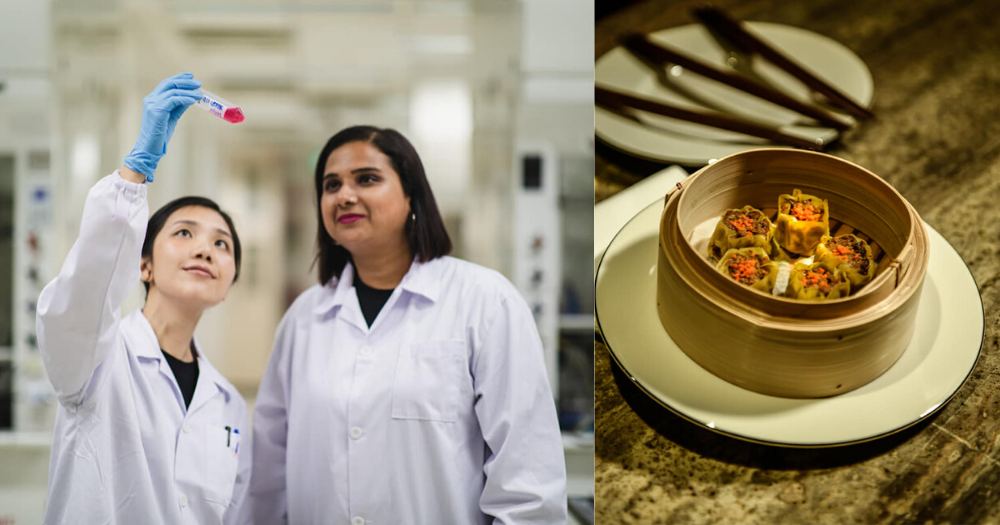A local company, Shiok Meats, aims to produce lab-grown seafood by growing and harvesting cells instead of harvesting animals from the ocean or farms.
According to their website, the team is looking at producing cell-based shrimp, crab and lobster meat.
How does cell-based meat work?
Cell-based meat is sometimes called cultured meat or lab-grown meat.
According to stem cell scientist and chief executive officer (CEO) of Shiok Meats, Sandhya Sriram, the process of making cell-based meat is similar to brewing beer or making bread, reported CNA.
Her company removes stem cells from live shrimps grown without antibiotics and places the cells into a bioreactor, a machine with controlled temperature and conditions to allow the cells to grow and multiply.
In the bioreactor, the cells grow and divide, due to the liquid nutrient, or "nutrient soup" they are in.
Sandhya explained to CNA what is in the nutrient liquid that the cells 'eat':
“It’s a mix of proteins, carbohydrates and fats, very similar to what the animal would eat itself. But because the cells don’t have a digestive system, you have to give them a very simple ingredient mix."
Here's a graphic that simplifies the process of how cell-based meat is made:
 Photo by Shiok Meats
Photo by Shiok Meats
An alternative to farmed shrimps
According to a study done on shrimp farming in 2013, it was found that coastal environments, such as mangroves, were destroyed.
In addition, intensive shrimp farming leads to an outbreak of disease amongst the shrimp.
To curb the disease outbreak, a large amount of antibiotics being used on the animals.
As for the labour involved in the shrimp industry, it was reported in 2018 that the seafood industry in Southeast Asia is still rife with human trafficking and slave labour.
This is where Shiok Meats' cultured shrimp aims to disrupt the S$55 billion shrimp market.
Sandya explained that the cell-based shrimp can be consumed without guilt as the team does not use shrimps treated with antibiotics or harmful chemicals:
“...I know that I can eat it without any guilt ... I know where exactly it comes from and I know that we’ve made it.”
“We take those shrimps that are not treated with antibiotics (nor) bleach, (and) don’t have heavy metals or mercury.”
As for safety standards, Shiok Meats runs its cultured meat by third-party organisations that carry out accredited safety testing, reported CNA.
Launched cell-based shrimp siew mais in 2019
In Mar. 2019, Shiok Meats launched shrimp dumplings (or siew mais) made with their cell-based shrimp at Grand Hyatt Singapore.
 Photo by Shiok Meats/Facebook
Photo by Shiok Meats/Facebook
Then, the eight dumplings cost S$5,000, which would be about S$625 per dumpling.
This year, the price of one siew mai made with their cell-based meat is only S$150, reported CNA.
Sandhya explained that the price of their cell-based meat has dropped as the team is making their own nutrient liquid, from plant-based ingredients, as compared to buying this nutrient solution from pharmaceutical companies.
In Apr. 2019, the company attracted S$4.6 million in investments, from an American start-up investor, Y Combinator, and the CEO of Monde Nissin, who owns the mycoprotein brand, Quorn, reported Forbes.
Possible for S'poreans to growing meat at home in 10 years' time
Sandhya envisions that we can grow our own meat at home within the next decade, reported CNA.
She believes that people would have a small bioreactor, a machine that can maintain the right temperature and conditions, to grow cells into meats.
This idea is not as far-fetched as it seems.
In Japan, a nonprofit, Shojinmeat Project, has given students the chance to culture meat at home, through high-tech microwave-sized boxes.
Here's what the incubator by Shojinmeat that cultures cell-based meat looks like:
At Maker Faire Tokyo! https://t.co/Y0M04Elq9g
— Shojinmeat Project (en) (@shojinmeat) August 5, 2017
For now, the CEO is looking to introduce lab-grown shrimp to restaurants in Singapore, as early as next year, so that the public can order shrimp siew mai dish, shrimp fried rice or a shrimp soup dish.
As for consumers who might find cultured meat 'unnatural', Sandhya points out that “most of your packaged food that you get in a supermarket now” were created in labs “at one point in time”.
More cell-based meats & alternative proteins in the future
According to Guardian, livestock on large-scale farms, such as cows, have contributed to rising methane emissions in Asia, Latin America and Africa, due to an increase in meat-heavy diets.
Higher temperature due to climate change also affects the sea creatures as the ocean absorbs large amount of the greenhouse gases in the atmosphere. Warmer seawater can alter the migration and reproduction of some fish and increase the incidence of pathogens and marine diseases.
In addition, animals raised for food are often raised in cruel conditions, and have negative impacts on public health and the environment.
According to the World Economic Forum, access to healthy and sustainable protein sources will be a challenge that the world could face in the future as the world population is projected to reach ten billion by 2050.
This is where a mix of alternative proteins, such as plant-based, cell-based , fungi-based and insect-based proteins fill the gap.
You can find out more about cell-based shrimp here.
Top photos via Shiok Meats/Facebook
If you like what you read, follow us on Facebook, Instagram, Twitter and Telegram to get the latest updates.
